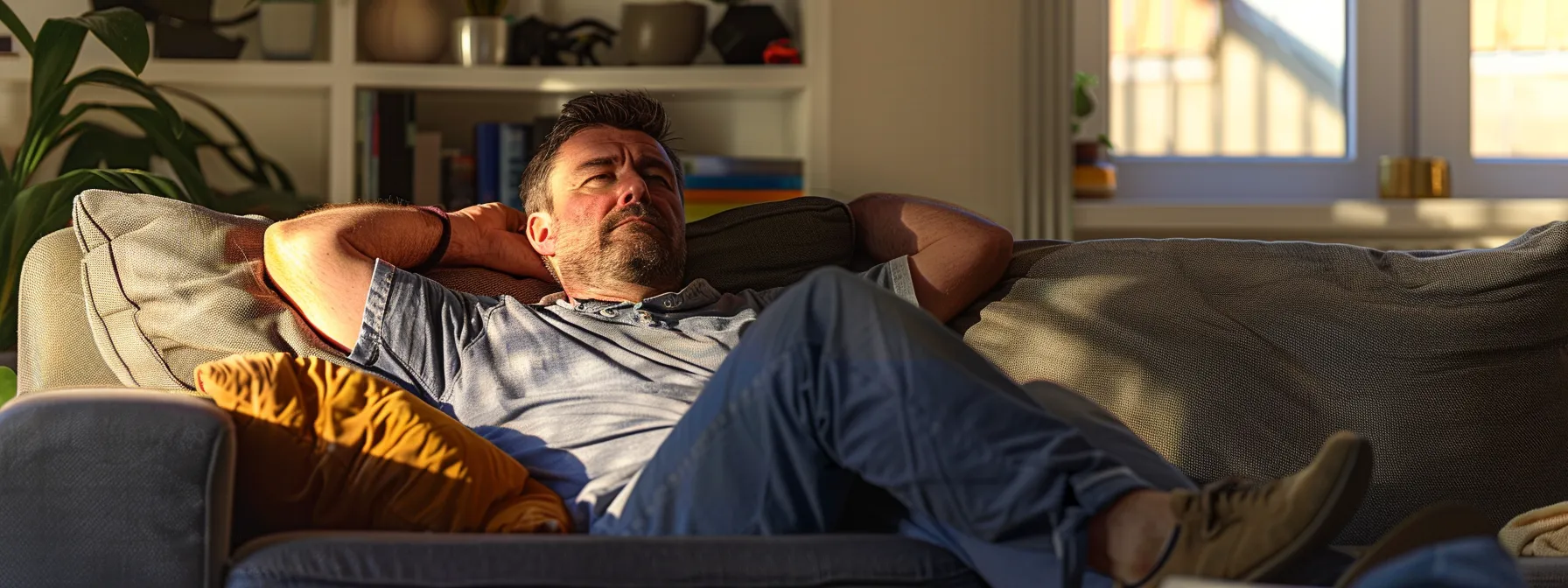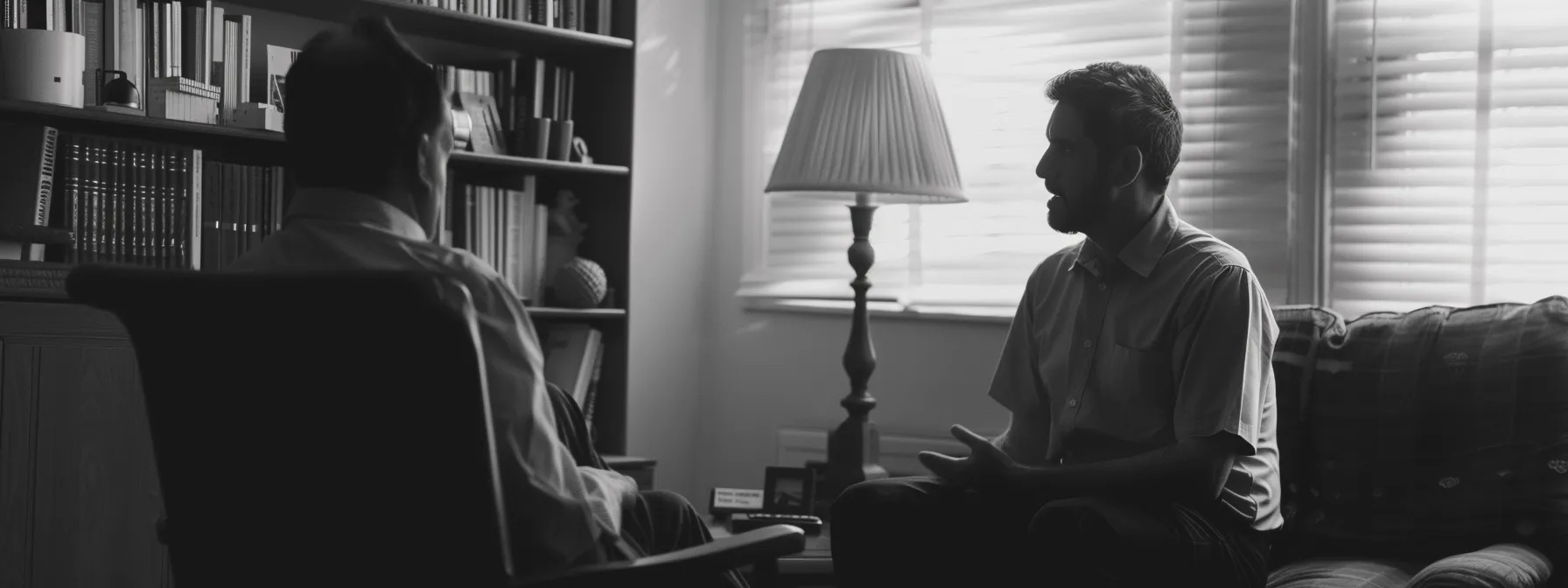Chronically Anxious in DC
Coping with Chronic Anxiety: Understanding Symptoms, Causes, and Solutions
Feeling chronically anxious disrupts everyday life. Chronic anxiety is persistent and overwhelming worry. This article will cover symptoms, causes, and strategies for managing it effectively. For more information on managing chronic anxiety, consider exploring anxiety therapy treatment in Washington DC.
Key Takeaways
- Chronic anxiety differs from typical anxiety as it involves persistent, excessive worry that disrupts daily life and can occur without clear triggers.
- Common symptoms of chronic anxiety include physical manifestations such as rapid heartbeat and digestive issues, as well as emotional challenges like concentration difficulties and sleep disturbances.
- Effective coping strategies for chronic anxiety include psychotherapy options like Cognitive Behavioral Therapy (CBT), medication management, and the adoption of healthy lifestyle habits.
Coping with Being Chronically Anxious: Symptoms, Causes, and Solutions
Living with chronic anxiety is a daily battle against excessive worry that often feels unrealistic and overwhelming. This persistent condition can lead to avoidance behaviors, where individuals steer clear of certain places or situations to prevent anxiety episodes. Unlike more short-lived anxiety that specific events may trigger, chronic anxiety can occur without any apparent reason, making it even more challenging to manage.
Anxiety disorders, including generalized anxiety disorder (GAD), panic disorder, panic attacks, and post-traumatic stress disorder, can significantly disrupt daily life, making it difficult to function normally. The constant state of high anxiety can hinder one’s ability to focus, perform daily tasks effectively, and maintain healthy relationships. The Anxiety and Depresion Association of America provides valuable resources for those affected.
CALLOUT While “chronic anxiety” isn’t an official diagnosis in the medical world, it’s a term that many people use to describe the ongoing, relentless anxiety they feel. This type of anxiety isn’t always tied to a specific event or trigger—it can show up unexpectedly, even in moments when everything seems fine on the surface. If you’ve found yourself frequently overwhelmed by worry or stress, you’re not alone, and there are ways to manage it. For those seeking assistance, anxiety therapy treatment can offer significant relief and tools for coping.
However, understanding the symptoms and causes of chronic anxiety is crucial for finding effective solutions and coping strategies.
Understanding Chronic Anxiety
Chronic anxiety is more than just feeling anxious occasionally; it’s characterized by an ongoing and excessive worry that interferes with daily responsibilities. This type of anxiety can lead to significant challenges in daily life, affecting one’s ability to function normally. People with chronic anxiety often engage in avoidance behaviors, steering clear of places or situations that might trigger their anxiety.
Unlike passing anxiety, which is often a response to specific triggers, chronic anxiety is persistent and can occur without any apparent reason. It’s essential to seek professional help if anxiety starts to affect daily life, work, or relationships. Understanding chronic anxiety is the first step towards managing it effectively and improving one’s quality of life.
Common Symptoms of Chronic Anxiety
Chronic anxiety manifests in various ways, impacting both the mind and body. Physical symptoms might include:
- Rapid breathing
- Changes in heart rate
- Digestive disturbances
- Rapid heartbeat
- Hyperventilation, which can be frightening and add to their stress
- Sweating
- Trembling
- Gastrointestinal issues
These are common physical manifestations of chronic anxiety.
Emotionally, chronic anxiety often leaves individuals feeling on edge, restless, or tense. This constant state of alertness can lead to fatigue and difficulty concentrating. Trouble sleeping is another frequent complaint, as racing thoughts and anxiety symptoms make it hard to fall or stay asleep. These symptoms can significantly disrupt daily life, making managing responsibilities and maintaining relationships challenging.
Causes of Chronic Anxiety
The causes of chronic anxiety are multifaceted, involving genetic, biological, and environmental factors. A genetic predisposition can play a role in the development of anxiety disorders, making some individuals more susceptible than others. However, it’s also important to know that genes aren’t a determining factor but a likely contributing factor. Dysregulation in brain chemistry, particularly in circuits that govern fear and emotion, has been linked to anxiety disorders. Biological factors, including variations in brain structure and the functioning of neural circuits related to fear and anxiety, can influence the development of generalized anxiety disorder (GAD). Anxiety therapy treatment Washington DC offers comprehensive strategies to manage and cope with these disorders, focusing on the individual’s unique experience of anxiety.
Family history and environmental factors can further increase the risk. Experiencing stressful life events, such as abuse or witnessing violence, can contribute to anxiety disorders. Additionally, external factors like being in stressful environments can lead to the development of generalized anxiety disorder. For those seeking further support, exploring different types of therapy may be beneficial.
Women and those assigned female at birth are approximately twice as likely to experience anxiety disorders compared to men. Understanding these causes is crucial for developing effective coping strategies.
The causes of chronic anxiety are multifaceted, involving:
- Genetic factors can play a role in the development of anxiety disorders, making some individuals more susceptible than others.
- Biological factors, including dysregulation in brain chemistry, particularly in circuits that govern fear and emotion, are linked to anxiety disorders.
- Environmental factors also influence the development of generalized anxiety disorder (GAD).
The Impact of Chronic Anxiety on Physical Health
Chronic anxiety doesn’t just affect the mind; it has profound impacts on physical health as well. Persistent anxiety can elevate stress hormones, increasing the risk of developing various chronic physical health conditions, including heart disease. The cardiovascular, digestive, and respiratory systems can all be adversely affected by chronic anxiety, leading to significant physical symptoms.
Long-term anxiety can also weaken the immune system, making the body more susceptible to illnesses and infections. Digestive issues, such as irritable bowel syndrome and other gastrointestinal disorders, are common among those with chronic anxiety. Muscle tension and chronic pain, including joint pain or conditions like fibromyalgia, are other physical manifestations that can result from prolonged anxiety.
These impacts highlight the importance of addressing chronic anxiety not just for mental health, but for overall physical well-being.
How Generalized Anxiety Disorder (GAD) Relates to Chronic Anxiety
When people talk about chronic anxiety, they’re often describing feelings that can overlap with what clinicians call Generalized Anxiety Disorder (GAD). GAD is characterized by excessive, persistent worrying that occurs most days over at least six months. The worry feels difficult to control and can become overwhelming, making it hard to focus on anything else.
Common symptoms include:
- restlessness
- fatigue
- difficulty concentrating
- irritability
- muscle tension
- sleep disturbances
For those with GAD, the anxiety often extends to everyday concerns—like work, health, or relationships—and can disrupt daily life. This state of constant worry isn’t triggered by any single event but instead feels ever-present. Importantly, the symptoms of GAD aren’t better explained by another mental health condition or the effects of substances.
Understanding how GAD fits into the broader concept of chronic anxiety can help you recognize when anxiety is more than just temporary stress and when it might be time to seek support.
Professional Treatment Options
Professional treatment options are vital for those coping with chronic anxiety. These options often include a combination of psychotherapy, medications, and lifestyle adjustments, tailored to the individual’s specific needs.
The following subsections will explore these treatment options in more detail, highlighting their importance in managing anxiety disorders effectively.
Psychotherapy
Psychotherapy is a cornerstone in the treatment of chronic anxiety. Various therapeutic approaches, including Cognitive Behavioral Therapy (CBT) and exposure therapy, are employed to help individuals confront and manage their fears. Psychotherapy provides a supportive environment where individuals can explore their anxiety symptoms, understand their triggers, and develop coping strategies.
The Therapy Group of DC offers a comprehensive approach to psychotherapy, addressing issues such as anxiety, depression, and relationship challenges. Their evidence-based therapies are tailored to meet each client’s unique needs, ensuring personalized and effective treatment strategies. This holistic approach is crucial for managing chronic anxiety and improving overall mental health.
Medication
Medications can be an important part of the treatment plan for chronic anxiety. Common medications prescribed for anxiety include SSRIs (Selective Serotonin Reuptake Inhibitors) and SNRIs (Serotonin-Norepinephrine Reuptake Inhibitors). These medications can help reduce anxiety symptoms by affecting neurotransmitters involved in regulating mood and stress. Benzodiazepines may also be prescribed for short-term relief, but they come with potential issues such as tolerance and dependency. It’s important to consult with a healthcare provider to find the right medication and dosage and manage any side effects.
Buspirone is another medication option that typically takes about 3-4 weeks to become fully effective. Medications should be considered as part of a comprehensive treatment plan, often in conjunction with psychotherapy and lifestyle changes, to effectively manage chronic anxiety and improve quality of life.
Effective Coping Strategies for Chronic Anxiety
Managing chronic anxiety effectively often requires a combination of coping strategies. These can range from therapeutic approaches like Cognitive Behavioral Therapy (CBT) and Psychodynamic Psychotherapy to lifestyle changes and relaxation techniques. Successful treatment options are available, and they can significantly improve one’s quality of life.
The following subsections will delve into these coping strategies in detail.
Cognitive Behavioral Therapy (CBT)
Cognitive Behavioral Therapy (CBT) is a widely recognized and effective method for managing chronic anxiety. CBT focuses on modifying negative thought patterns that contribute to anxiety, helping individuals develop healthier thinking habits. CBT helps individuals recognize and challenge negative thoughts, altering emotional responses and behaviors linked to anxiety. This therapeutic approach empowers individuals to understand the connection between their thoughts, feelings, and actions, fostering behavioral changes that reduce anxiety symptoms.
Practically, CBT requires close collaboration with a mental health professional to set goals and develop personalized coping strategies. Techniques such as cognitive restructuring and exposure therapy are commonly used to help clients face their fears in a controlled environment, ultimately reducing the power these fears hold over their daily lives.
The effectiveness of CBT in treating chronic anxiety underscores its importance as a primary therapeutic approach.
Psychodynamic Psychotherapy
Psychodynamic Psychotherapy offers a different approach by focusing on uncovering unconscious conflicts that contribute to chronic anxiety. This form of therapy helps clients gain insight into underlying emotional issues, often rooted in early life experiences and relationships. Exploring past experiences and unresolved emotional struggles helps individuals understand their influence on current feelings and behaviors.
Through this deeper understanding, Psychodynamic Psychotherapy aims to alleviate chronic anxiety by addressing the emotional patterns that drive it. This therapeutic approach is particularly beneficial for those who seek to understand the deeper roots of their anxiety and how past experiences shape their present emotional responses.
Working with a mental health professional trained in psychodynamic therapy can provide the support needed to navigate these complex emotional landscapes and foster long-term emotional growth.
Relaxation Techniques
Relaxation techniques are essential tools in managing chronic anxiety. Methods such as deep breathing exercises, progressive muscle relaxation, and mindfulness meditation can significantly reduce anxiety symptoms. Deep breathing exercises help calm the nervous system and release stress hormones, reducing physical symptoms like muscle tension and rapid heartbeat. Progressive muscle relaxation involves tensing and then slowly relaxing different muscle groups, which can help alleviate the physical manifestations of anxiety.
Mindfulness meditation and visualization techniques are also effective in promoting relaxation and reducing anxiety. Practicing mindfulness encourages focus on the present moment, which helps reduce anxious thoughts about the future or past. Incorporating these relaxation techniques into daily routines can provide a sense of control and calm, helping individuals cope with stressful situations more effectively.
Healthy Lifestyle Habits
Healthy lifestyle habits play a crucial role in managing chronic anxiety. Regular exercise, proper nutrition, and adequate sleep are foundational components of a balanced lifestyle that supports mental health. Engaging in physical activity releases endorphins, which are natural mood enhancers that can reduce anxiety and improve overall well-being. Maintaining a balanced diet that includes a variety of fruits, vegetables, and whole grains can also help mitigate anxiety symptoms.
Prioritizing sleep is essential, as lack of rest can worsen anxiety symptoms and increase irritability and fatigue. Hormonal changes triggered by anxiety can result in unhealthy eating behaviors, potentially leading to weight gain and other health issues. Types of therapy for mental health can offer support in managing these anxiety symptoms and related issues.
Making lifestyle changes that promote physical and mental health can provide a strong foundation for managing chronic anxiety effectively.
The Therapy Group of DC’s Approach to Treating Chronic Anxiety
The Therapy Group of DC employs a range of evidence-based methods to treat chronic anxiety, including Cognitive Behavioral Therapy (CBT) and Psychodynamic Therapy. CBT focuses on altering negative thought patterns and behaviors, helping clients develop healthier coping mechanisms. Psychodynamic therapy, on the other hand, helps clients explore unresolved conflicts and emotional patterns from their past, fostering deeper self-awareness and emotional growth.
Emotionally Focused Therapy (EFT) is another method used at The Therapy Group of DC, particularly effective for couples, helping them build secure relationships and manage emotional responses.
The Therapy Group tailors treatment plans to individual needs, ensuring personalized care that addresses unique anxiety symptoms and challenges. This approach, informed by trauma-informed care principles, recognizes the effects of discrimination and minority stress, providing inclusive and comprehensive mental health care. For more insight on understanding and managing these experiences effectively, you might find Cultural Competence: A Nerds Guide to Enhanced Therapy in Washington, DC, helpful.
Person-Centered and Inclusive Care at The Therapy Group of DC
The Therapy Group of DC emphasizes person-centered and inclusive care, developing customized treatment plans tailored to meet individual client needs. This approach ensures that therapy is responsive and dynamic, adapting to the unique backgrounds and experiences of each client. Therapists at the group engage in continuous education to stay current with the latest advancements in mental health practices, ensuring high-quality care.
Ongoing communication is encouraged to ensure clients feel comfortable and trust in the therapeutic process. The Therapy Group prioritizes individual development while acknowledging clients’ unique perspectives within the broader community. This inclusive environment promotes mutual respect and open dialogue, allowing clients to discuss their challenges with their individual narratives in mind.
For over two decades, The Therapy Group of DC has been at the forefront of inclusive, evidence-based mental health care.
Summary
In summary, chronic anxiety is a complex condition that requires a multifaceted approach for effective management. Understanding its symptoms and causes is the first step toward finding relief. Various coping strategies, including Cognitive Behavioral Therapy (CBT), Psychodynamic Psychotherapy, relaxation techniques, and healthy lifestyle habits, can significantly improve one’s quality of life.
Professional treatment options, such as psychotherapy and medication, are crucial for those struggling with chronic anxiety. The Therapy Group of DC offers a comprehensive and personalized approach to treatment, ensuring that clients receive the care they need. By addressing both the emotional and physical aspects of anxiety, individuals can find hope and healing.
The Therapy Group of DC is dedicated to helping individuals manage chronic anxiety through evidence-based therapies tailored to each client’s needs. With over two decades of experience, our team of skilled therapists offers comprehensive support using approaches like Cognitive Behavioral Therapy (CBT) and Psychodynamic Therapy.
By creating a warm, inclusive, and person-centered environment, we ensure that clients feel heard and empowered on their path to wellness. If you’re struggling with persistent anxiety and are ready to take the next step, we’re here to help. Reach out today to schedule an appointment and begin your journey towards a healthier, more balanced life.
Frequently Asked Questions
What is chronic anxiety?
Chronic anxiety involves persistent and excessive worry that is often unrealistic and disrupts daily responsibilities. It can significantly impact one’s quality of life, making it essential to seek effective strategies for management.
How does chronic anxiety differ from typical anxiety?
Chronic anxiety is characterized by its persistence and occurrence without specific triggers, whereas typical anxiety is generally linked to identifiable situations. This distinction highlights the ongoing nature of chronic anxiety compared to more situational forms.
What are common physical symptoms of chronic anxiety?
Common physical symptoms of chronic anxiety include rapid breathing, irregular heart rate, and digestive disturbances. Recognizing these symptoms can significantly aid in managing anxiety effectively.
What causes chronic anxiety?
Chronic anxiety can be caused by genetic predisposition, imbalances in brain chemistry, and stressful life events. Understanding these factors is crucial in addressing and managing anxiety effectively.
What professional treatments are available for chronic anxiety?
Effective professional treatments for chronic anxiety encompass psychotherapy, medication, and lifestyle modifications. These approaches can help you manage symptoms and improve your overall well-being.




